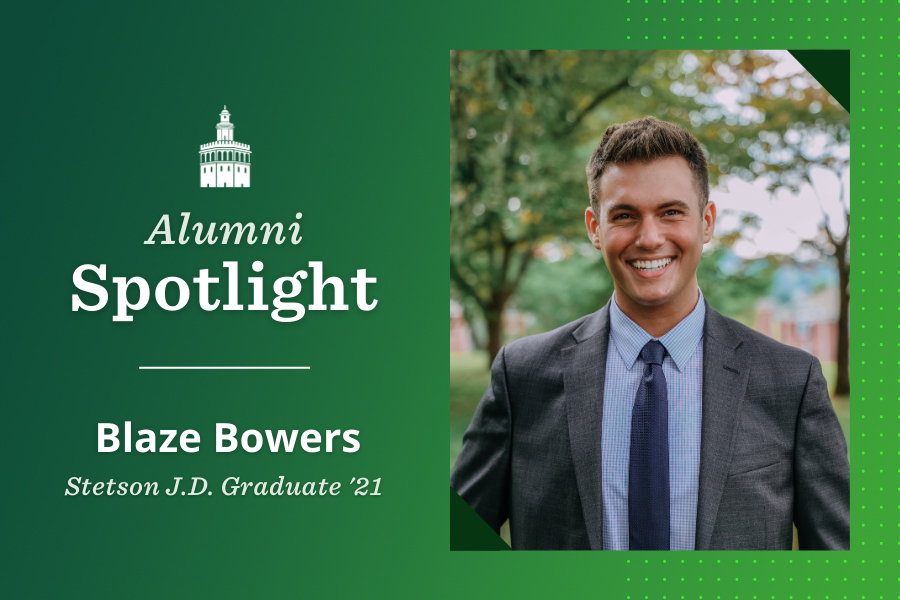So, you want to study Elder Law. Earning an Online LL.M. in Elder Law from Stetson is a smart way to do that. The online format is specifically designed for working professionals. Our diverse student body is made up of people who have just completed their J.D., and those who have spent years in the field.
All your questions about what to expect, applying, financial aid and more will be answered below. As always, if you still have questions our team is here to help.
Meet Our Distinguished Faculty
Your Elder Law faculty are made up of distinguished members of law and academia. You’ll learn from working practitioners residing all over the country who can teach you not only the academic aspects of elder law, but what you’ll need to know as a practitioner, too.
Two professors you'll learn from are Rebecca Morgan and Roberta Flowers. Morgan is one of the most renowned academics in Elder Law and well-known throughout the U.S. and the world — and is the only academic to be the President of the National Academy of Elder Law Attorneys. Flowers is the co-director of the Elder Law program, and she previously served as the director of the Center for Exellence in Advocacy. In 2005 she received the Faculty Professionalism Award from the Florida Supreme Court.
Why Should You Get an LL.M. Rather Than Take the CELA (Certified Elder Law Attorney)?
While both the LL.M. and the CELA are the same in practice, the real difference is that your LL.M. counts as an academic credit. When others see you have an LL.M., they know you did more than get a certificate, you learned and studied the practice.
Plus, attorneys with an LL.M degree are in high demand for policy positions and speaking engagements, whereas the CELA doesn’t give you the deep knowledge those positions require.

What You Can Expect from an Online LL.M. in Elder Law
The Elder Law LL.M. at Stetson Law is earned completely online except for one weekend during the first semester. Each semester runs for 13 weeks, and the Summer Semester is shortened to seven.
The classes are fast-paced. You have one week for each assignment, so while you can’t work ahead you can complete work at anytime during the week. The classes are asynchronous, so you don’t have to be online at a specific time.
The program has three components to the online portion, and which you will complete in each week. First, you’ll watch a lecture. These are taped by the faculty and are often 10 to 20 minutes or longer. Next, you’ll have a reading assignment or outside research. Most of this reading will be online, but some classes require you buy a book. These books aren’t your typical law school textbooks, these are books for working professionals.
Finally, there’s the discussion board. This is the virtual classroom and where you’ll interact with your professor and with other students. On the discussion board, your professor will pose questions to fuel a conversation. Much of the learning occurs as you discuss the topics with students on the discussion board.
The Stetson Law LL.M. in Elder Law involves one in-person weekend, which occurs during the Fall semester. All students in the program attend the National Conference on Special Needs Planning and Special Needs Trusts held at Stetson Law, and then attend a Select Topics Day where you meet with alumni, faculty, and classmates.
The Select Topics Day covers popular topics and gets you started in the program. During this time, members of Stetson faculty will sit down with you to plan out your coming years and schedule your courses.
What are the Differences Between the Elder Law Concentration in the J.D. and the LL.M. in Elder Law?
LL.M. is a more advanced degree than J.D., so the classes are more advanced, too. Not only because of the content, but also because the classes go beyond academic ideas and discuss the application in practice.
How Much Time Should You Expect to Invest in Each Class?
Including the lecture, reading, and the discussion board, you should estimate about 6-10 hours per week. Remember that depending on the class and your workload this may change.
Most students take one or two classes per semester, with three being the absolute maximum. Unless you are certain you can devote your time to three classes, taking a full load is discouraged, especially for the first semester. Instead, it’s recommended that you start slow, especially if it’s been a while since you last attended school.
How Long Does the LL.M. in Elder Law Take?
If you were to take a full load of classes each semester, the program could be completed in two semesters and one summer. Most people don’t do this — and instead spread the courses out to make them manageable. All that is required is you complete the program within six years.
What is the Curriculum Like?
The total program is 25 hours, and the required curriculum includes the courses like Ethics, Guardianship, Long Term Care Planning, Law and Aging, and a basic tax course. The electives include Representing the Elderly (a litigation course), Veterans Law, Law Mental Health, and Disability Law.
If you have no elder law experience, you will take an elective course “Introduction to Elder Law” first, where you’ll get a broad overview of the subject. All students who have taken this class have always been happy that they did so.
How Many Students are in the Elder Law Classes?
Classes have about 12 to 17 students, with no more than 20 allowed. Overall, there are 30 to 45 students somewhere in the program.
How Will Students Be Graded?
The grading system for the LL.M. in Elder Law is based on an honor scale, not the traditional 4.0 scale. You’ll receive a fail, pass, credit, honors, or high honors grade. Your grade comes from a combination of your discussion board participation and the end of the semester exam. It depends on the professor which is weighted more.
How Much Does the Program Cost, and What Financial Aid is Provided?
The LL.M. in Elder Law costs $1,400 per credit hour (most classes are 3 credit hours each), and there is a $50 technology fee per semester.
How can you pay for it? If you’re lucky, your firm will pay for it, but we realize that’s not always the case. If you’re a veteran, you can use your benefits (Stetson is a Yellow Ribbon School. In addition to your Chapter 33 benefits, we award up to $5,000 per year toward tuition and fees and the VA matches it). Some people pay for it themselves out of pocket, in which case Stetson can work with you to create a payment plan (20% down at the start of the semester and payments are spread out over the rest of the semester, with a $100 payment plan fee).
Other people opt for Federal Student Aid. To qualify you need to be taking 5 credit hours, usually 2 courses, which makes you a half-time student and qualified for loans.
The good news is that scholarships are available based on merit and need. These scholarships grant $1,400 per class, which cuts the tuition one-third. We encourage all students to apply for these. When you apply, share with us why you need help and why you deserve it. If awarded, you need to reapply every year, but if you keep your grades up you can continue to receive the scholarship
What is the Process of Applying and Attending?
When you decide to attend Stetson’s LL.M. program, it’s time to start the application process. If you’re only applying to Stetson (and why wouldn’t you?!), apply online through our website. There’s no application fee! If you decide on applying to a few different schools, you might consider using the LSAC application.
You’ll need to send a transcript from every school you’ve attended along with two letters of recommendation. You also need to write a personal statement. This statement is only a page or two and explains exactly why you are interested in elder law. What is it about elder law that makes you want to take this next step? Many people go into it for personal reasons, and if that’s your case, share it. Think about what has brought you to elder law, and why you want to dig deep into it.
When your application is received, it goes to a committee. We make a decision and you are notified fairly quickly. When you’re accepted, it’s time to pay your deposit, start on admin work, and collect information about your classes.
Stetson begins accepting applicants as early as January. While Stetson accepts applications on a rolling basis, it’s advisable to apply by July 1st. The deadline to send all of your materials is August 1st.
You’re in Good Company
We are proud of our alumni. The program has graduated 108 students since its inception. Our very first graduate of the program ever is the current president of NAELA. If you want to hear about the program from one of our alumni, we can put you into contact with them. Our Alumni are very active and would be happy to answer your questions.
Still Not Sure About the LL.M.?
Our alumni come out of the program feeling much more competent about elder law and they are very comfortable and knowledgeable about their practice. Making time for professional development and advancing your knowledge and skills in Elder Law will be worth it to your future success.
Stetson works with you. We know you live a busy life outside of school. If you ever have a big trial coming up, or a big life event, we can adjust your schedule — that’s the beauty of an online course! And if you need to take a break from the course, we can grant you a leave of absence for a semester or two.
Whatever your questions, our team is available to talk to you. Email, call, Skype, or visit us.
Topics: Articles

.jpg)



